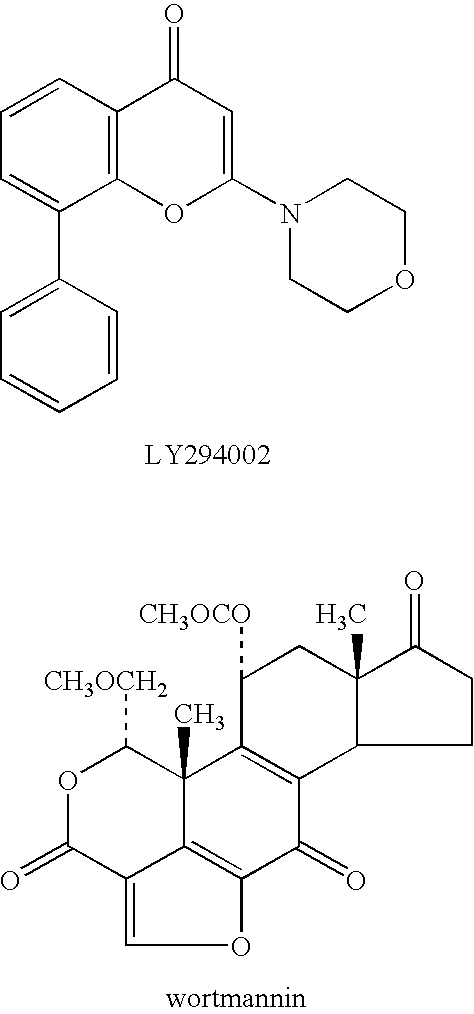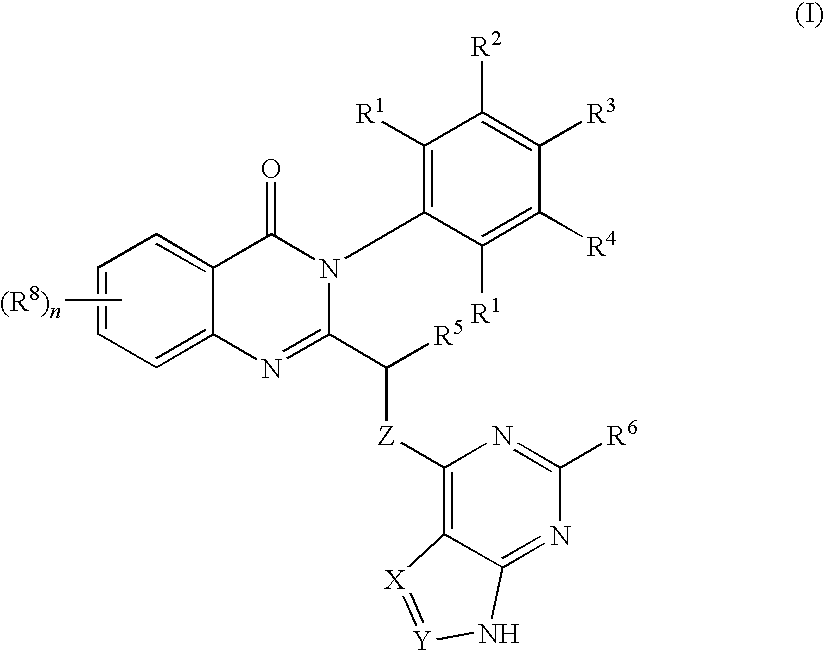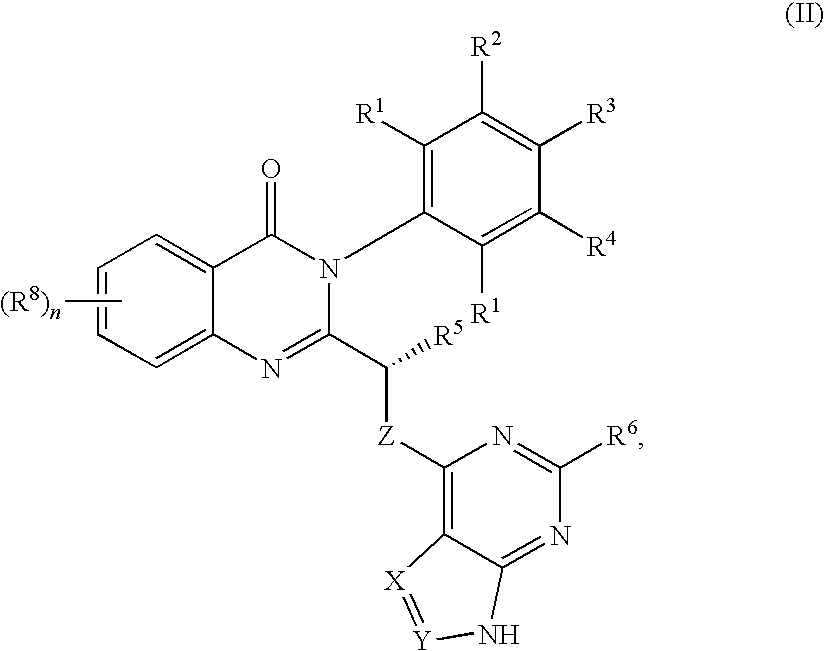Quinazolinones as inhibitors of human phosphatidylinositol 3-kinase delta
a phosphatidylinositol 3-kinase and quinazolinone technology, applied in the field of phosphatidylinositol 3kinase (pi3 k) enzymes, can solve the problems of limited utility of these compounds in studying the roles of individual class i pi 3-kinases, lack of structural and functional features of pi 3-kinase enzymes, etc., to inhibit growth or proliferation
- Summary
- Abstract
- Description
- Claims
- Application Information
AI Technical Summary
Benefits of technology
Problems solved by technology
Method used
Image
Examples
example 1
Preparation and Purification of Recombinant PI3Kα, β, and δ
[0186]Recombinant PI3K heterodimeric complexes consisting of a p110 catalytic subunit and a p85 regulatory subunit were overexpressed using the BAC-TO-BAC® HT baculovirus expression system (GIBCO / BRL), and then purified for use in biochemical assays. The four Class I PI 3-kinases were cloned into baculovirus vectors as follows:
[0187]p110δ: A FLAG®-tagged version of human p110δ (SEQ ID NOS: 1 and 2) (see Chantry et al., J. Biol. Chem., 272:19236-41 (1997)) was subcloned using standard recombinant DNA techniques into the BamH1-Xba1 site of the insect cell expression vector pFastbac HTb (Life Technologies, Gaithersburg, Md.), such that the clone was in frame with the His tag of the vector. The FLAG® system is described in U.S. Pat. Nos. 4,703,004; 4,782,137; 4,851,341; and 5,011,912, and reagents are available from Eastman Kodak Co.
[0188]p110α: Similar to the method used for p110δ, described above, a FLAG®-tagged version of p11...
examples 2-6
[0194]Because PI3Kδ is expressed at significant levels in leukocytes, it is important to study the effects of the PI3Kδ-selective inhibitor on leukocyte functions. Accordingly, the effects of PI3Kδ inhibition in several types of leukocytes were examined. Neutrophils were examined to determine the effects that selective inhibition of PI3Kδ might elicit (Example 2, below). It surprisingly was found that selective inhibition of PI3Kδ activity appears to be significantly associated with inhibition of some but not all functions characteristic of activated neutrophils. In addition, the effects of PI3Kδ inhibition on B cell and T cell function also were tested (Examples 3-4, below). Moreover, as PI3Kδ also is expressed in osteoclasts, the effect of PI3Kδ inhibition on the function of these specialized cells was studied (Example 5, below).
example 2
Characterization of Role of PI3Kδ in Neutrophil Function
[0195]The effects of a PI3Kδ inhibitor of the invention on neutrophil functions such as superoxide generation, elastase exocytosis, chemotaxis, and bacterial killing can be tested.
[0196]A. Preparation of Neutrophils from Human Blood
[0197]Aliquots (8 mL) of heparinized blood from healthy volunteers are layered on 3 mL cushions of 7.3% FICOLL® (Sigma, St. Louis, Mo.) and 15.4% HYPAQUE® (Sigma) and centrifuged at 900 rpm for 30 min at room temperature in a table top centrifuge (Beckman). The neutrophil-rich band just above the FICOLL®-HYPAQUE® cushion is collected and washed with Hanks' balanced salt solution (HBSS) containing 0.1% gelatin. Residual erythrocytes are removed by hypotonic lysis with 0.2% NaCl. The neutrophil preparation is washed twice with HBSS containing 0.1% gelatin and used immediately.
[0198]B. Measurement of Superoxide Production from Neutrophils
[0199]Superoxide generation is one of the hallmarks of neutrophil ...
PUM
| Property | Measurement | Unit |
|---|---|---|
| weight | aaaaa | aaaaa |
| pH | aaaaa | aaaaa |
| pH | aaaaa | aaaaa |
Abstract
Description
Claims
Application Information
 Login to View More
Login to View More - R&D
- Intellectual Property
- Life Sciences
- Materials
- Tech Scout
- Unparalleled Data Quality
- Higher Quality Content
- 60% Fewer Hallucinations
Browse by: Latest US Patents, China's latest patents, Technical Efficacy Thesaurus, Application Domain, Technology Topic, Popular Technical Reports.
© 2025 PatSnap. All rights reserved.Legal|Privacy policy|Modern Slavery Act Transparency Statement|Sitemap|About US| Contact US: help@patsnap.com



